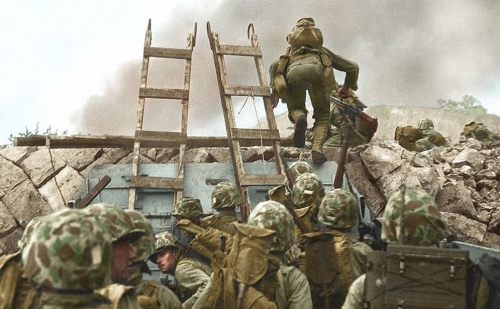The Cold War - The Korean War
 As 1952 was coming to an end President Truman must have seemed delighted to pass along to the next guy all the various assorted trouble spots that existed throughout the world. President-Elect Eisenhower had promised peace during his presidential campaign - but many of the issues at hand were interrelated: French Indochina, South Africa, the Middle-east, the Iron Curtain and, of course, Korea. During the final months of the Korean war, when it seemed that both sides were willing to make an arrangement that would bring the hostilities to an agreed upon end, the Chinese diplomats upped the ante
"... the Red regime in Peiping [Beijing] wanted a Great Power conference on Korea's future as a preface to new truce talks... Zhou Enlai, premier in Mao Tse Tung's government, has secretly proposed tossing all disputes - the prisoner exchange issue as well as the political future of Korea - into a conference of 11 nations."
Watch an informative Christian documentary on Korea in 1953 (- its in color).
Here is a collection of interviews with the men who, just a week earlier, had all been POWs in North Korea. Each of them recall their own unique account as to how they had been captured, their forced march to the camp, the poor medical care, sanitation and the high death toll from exposure to the cold. The intense practice of Communist brainwashing is described in detail. This single page analysis of the North Korean People's Army and the Army of South Korea will clue you in pretty quickly as to why President Truman hastened to get the necessary beans, bullets and band-aids delivered to the South as quickly as he did. This comparison, written by the U.S. Army History Section, clearly indicates that the North Korean force was intended to be an offensive army; well-equipped and fast-a-foot; the army of the South, by comparison, was intended (for some unexplained reason) to fight limited engagements - rather than prolonged, corps sized campaigns.
It was no surprise to the assorted military insiders of the world when the South Korean capital of Seoul was seized three days into the war. "Day and night U.S. Psychological Warfare soldiers in Korea risk their lives to talk and write Communists into submission. Their first leaflets hit the Reds just 36 hours after they first crossed the 38th Parallel. Today Pentagon brass praises 'Psywar' for influencing 70,000 North Koreans and Chinese Communists to surrender." When General James Van Fleet let it be known that much of the previous two years in Korea had been plagued by a shortage in ammunition, tempers flared in the Senate as both parties talked of convening an investigative committee. |
MORE ARTICLES >>> PAGE: * 1 * 2 * 3 * 4 * 5 * 6 * 7 * 8 * 9 * 10 * 11 * > NEXT |
|